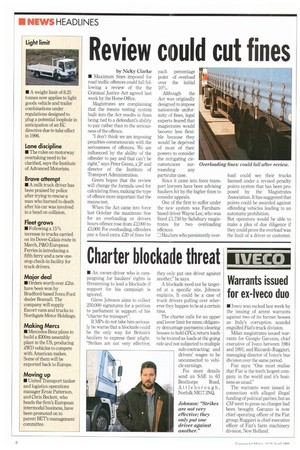Review could cut fines
Page 8

If you've noticed an error in this article please click here to report it so we can fix it.
by Nicky Clarke • Maximum fines imposed for road traffic offences could fall following a review of the the Criminal Justice Act agreed last week by the Home Office.
Magistrates are complaining that the means testing system built into the Act results in fines being tied to a defendant's ability to pay rather than to the seriousness of the offence.
"I don't think we are imposing penalties commensurate with the seriousness of offences. We are influenced by the ability of the offender to pay and that can't be right," says Peter Green, a JP and director of the Institute of Transport Administration.
Green hopes that the review will change the formula used for calculating fines, making the type of offence more important that the means test.
When the Act came into force last October the maximum fine for an overloading or drivers hours offence rose from £2,000 to £5,000. For overloading offenders pay a fixed extra £20 of fines for each percentage point of overload over the initial 10%.
Although the Act was originally designed to impose nationwide uniformity of fines, legal experts feared that magistrates would become less flexible because they would be deprived of most of their powers to consider the mitigating circumstances sur rounding any particular case.
Since it came into force transport lawyers have been advising hauliers hit by the higher fines to consider appeals.
One of the first to suffer under the new system was Farnhambased driver Wayne Lee, who was fined .£1,750 by Salisbury magistrates for two overloading offences.
Hauliers who persistently over load could see their trucks banned under a revised penalty points system that has been proposed by the Magistrates Association. It has suggested that points could be awarded against offending vehicles leading to an automatic prohibition.
But operators would be able to make a plea of due diligence if they could prove the overload was the fault of a driver or customer.
















































































